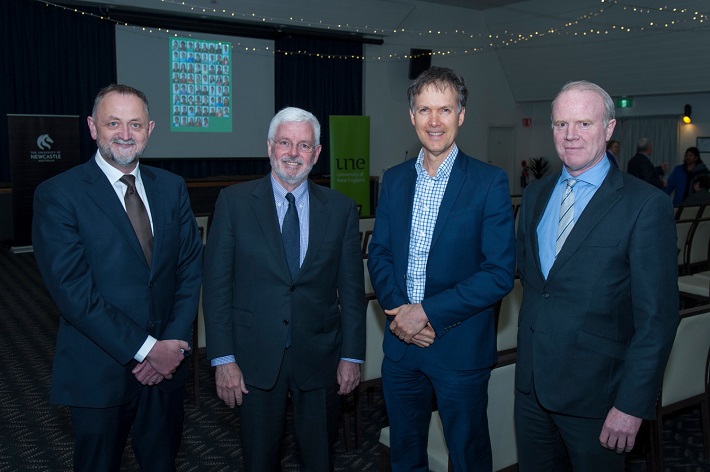The University of New England (UNE) and the University of Newcastle (UON) celebrated the 10 year anniversary of the Joint Medical Program (JMP) by hosting a special lecture presented by Australia’s first National Rural Health Commissioner Emeritus Professor Paul Worley last week.
In his speech Prof. Worley reflected on the gains made in addressing rural and regional health service delivery through education initiatives. He also set out the priorities for improving service provision in rural and regional communities in the future.
“We must have the right health professionals delivering the right care, in the right place at the right time,” Prof. Worley said.
His speech echoed the vision underpinning the JMP when it was established in 2008 as a partnership between two universities (UON and UNE) and two local health districts (Hunter New England and Central Coast Local Health District). The initiative was the first of its kind in Australia and was designed to address the serious medical workforce shortages in rural and regional areas.
The program enables students to gain broad regional and rural clinical experience during their training: as a result graduates have an understanding of the needs of rural and remote communities, are prepared for practice in a range of settings, and are more likely to undertake rural practice on completion of their degree.
Dean of the Faculty of Medicine and Health at UNE Professor Rod McClure said the shortage of doctors in regional and rural Australia is an ongoing concern which the JMP is addressing on different levels.
“The JMP is more than a metropolitan outreach initiative. It is an invaluable training program as it takes a special kind of person to practice medicine in the bush. Rural practitioners require generalist medical knowledge and diverse procedural skills that are matched to the full range of primary care needs of rural communities,” Prof. McClure said.
“In its role as a partner in the JMP, UNE’s School of Rural Medicine is forging collaborations between students, health professionals and professional organisations, and all layers of government, and working with communities to ensure rural Australians have access to the healthcare they need.”
Twenty five per cent of student placements in the JMP are in rural and remote communities, while 30% of placement activity occurs outside of traditional hospital settings including Aboriginal and Torres Strait Islander Health Services and Mental Health Facilities.


